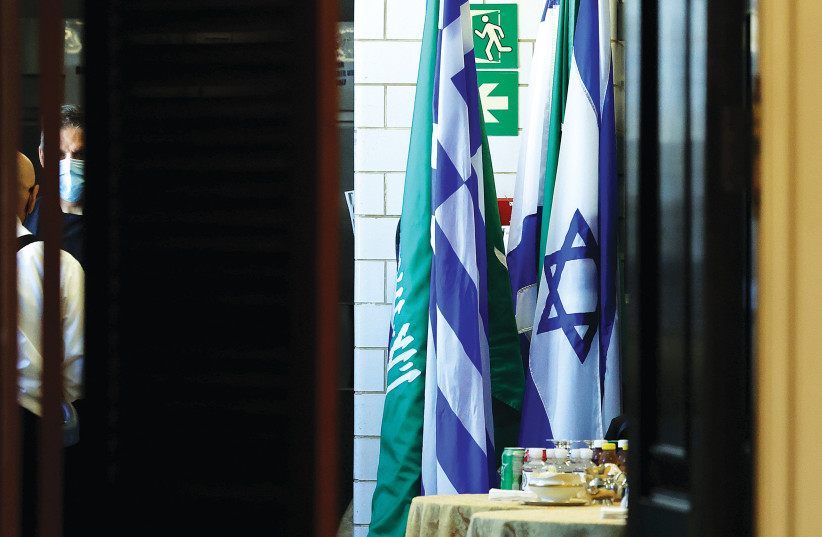There is a well-known saying in Pirkei Avot (Ethics of the Fathers): “Silence is a fence around wisdom.”
That means that sometimes it is better not to speak.
I thought of this parable following the recent episode involving US Commission on International Religious Freedom (USCIRF) chair Rabbi Abraham Cooper, who was reportedly asked to remove his kippah while visiting Diriyah, a historic town in Saudi Arabia and a UNESCO World Heritage Site.
As an Orthodox Jew, I stand by the right of any Jew, or any religious individual, who refuses to remove an item of religious clothing or identification. It is Rabbi Cooper’s right to refuse and even send a letter or message of complaint to his Saudi hosts about the bad and offensive behavior of the local bureaucrat who made the demand.
However, while that is acceptable and even preferable behavior, his decision to then run to the international media and embarrass his well-intentioned Saudi hosts was another thing entirely.

Saudi Arabia's transformation is a long-term revolution
Firstly, Rabbi Cooper and the rest of the delegation were in Saudi Arabia specifically to oversee the Saudi Vision 2030, a vision formulated by Saudi Crown Prince and Prime Minister Mohammed bin Salman (MBS) which aims to open up the kingdom to greater global engagement and tolerance.
It is a long-term revolution of an extremely conservative society, that is making leaps and bounds towards greater rights for women and minorities, with increased outreach to world religions and new regional partners.
It was not too long ago that openly identified Jews were not allowed in Saudi Arabia, and there was even a question on religious affiliation on visa entry applications. Now, Jews are warmly welcomed, and there is a Jewish community center in Riyadh led by a rabbi, who states that he walks around the whole country and is welcomed in his traditional ultra-Orthodox Jewish garb.
Additionally, as an IMPACT-SE review from last year showed, enmity toward Jews that used to be contained in Saudi Arabia school textbooks has been almost completely ripped out by the authorities.
Secondly, the recent thawing of relations between Saudi Arabia and the Jewish State is unprecedented and paradigm-changing.
Not only did the kingdom give the essential seal of approval to the Abraham Accords and Israel’s normalization agreements with the United Arab Emirates, Bahrain, Morocco, and Sudan, it has openly welcomed Israeli government ministers and allowed Israeli planes flyover rights across the kingdom’s territory.
There are even many commentators who suggest that the Hamas October 7 massacre was in part to prevent the impending full and official normalization agreement between the most important Arab and Muslim nation in the world and the Jewish State. This would end the Arab-Israel conflict once and for all and send a message to other Arab and Muslim countries that Israel is now an partner and ally.
Even after Israel’s entirely justified response to the Simchat Torah pogrom on October 7, the Saudi leadership has far from given up on normalization, and discreet talks have continued throughout the war against Hamas.
Nevertheless, despite all this positivity coming out of the kingdom, Rabbi Cooper’s grandstanding has sent shockwaves through the Saudi leadership.
In the Arab tradition, being a host is taken extremely seriously. They will have gone to great lengths to try and ensure that the USCIRF delegation was afforded the greatest of respect.
Unfortunately, as in every country, there will always be ignoramuses and low-level bureaucrats who make unscripted and unofficial decisions that can cause discomfort and offence.
That these unfortunate and offensive instructions have been turned into a condemnation against a whole country moving in a positive direction has already done immense damage.
To their credit, Saudi officials were quick to react and released a clarification and apology for the incident.
One of the first things anyone who has traveled to an Arab country learns is that one of the worst social faux pas you can make is to offend your host. Rabbi Cooper has taken this route, and it is incidents like these that have the potential to harm a relationship what has taken leaders and diplomats years to progress. He turned a minor, yet disturbing, personal episode into an international incident, achieving little but doing a lot of harm.
One would think that someone with decades of experience in the field of “tolerance” could have been more tolerant of his hosts. There were a thousand ways to deal with this situation that would not have offended and humiliated his Saudi hosts.
Basic to Rabbinic studies are the ethical lessons of Pirkei Avot. Therein is a maxim teaching that silence is a fence around wisdom. It would have behooved the chairman of the USCIRF to pause before over-reacting, and thus risking damage to a far greater relationship, that of the members of the Abraham Accords nations, present and hopefully future.
Let’s hope that the Saudi apology is met with one by Rabbi Cooper.
The writer is a Los Angeles-based philanthropist and real-estate developer who serves as chairman of the Golda Meir Commemorative Coin Committee and the Abraham Accords Roundtable in Washington DC.
